Dopo anni di costruzione di siti web WordPress, abbiamo imparato quanto sia importante avere una configurazione locale di WordPress sul proprio computer.
Avere WordPress sul vostro computer personale vi permette di sperimentare nuove funzionalità senza rischiare il vostro sito live, di immergervi in profondità nello sviluppo di WordPress e persino di costruire interi siti web prima che diventino operativi. È come avere una sandbox privata per tutti i vostri progetti WordPress.
Se siete utenti Windows, esistono numerosi modi per configurare WordPress in locale. Ma abbiamo ristretto il campo ai due metodi più semplici. In questa guida vi mostreremo come installare facilmente WordPress su un computer Windows, indipendentemente dalla versione in uso.
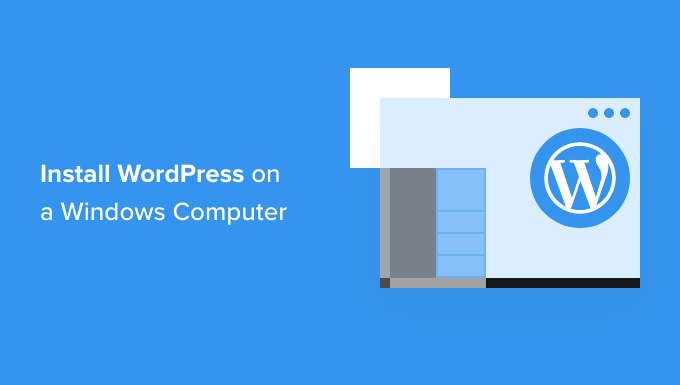
Perché installare WordPress su Windows?
Se siete utenti di Windows, l’installazione di WordPress in locale sul vostro computer offre diversi vantaggi.
Un’installazione locale di WordPress crea un ambiente di prova che non influisce sul vostro sito web reale. Questa configurazione, spesso chiamata server locale o localhost, è il vostro parco giochi personale per WordPress.
Gli sviluppatori di WordPress utilizzano regolarmente installazioni locali per il loro lavoro. Ad esempio, possono usarle per sperimentare nuovi plugin o temi o per testare il sito prima di aggiornare l’editor di blocchi Gutenberg.
Ma non è solo per i professionisti. Se siete alle prime armi con WordPress, una configurazione locale è perfetta per imparare. Potete esplorare le funzionalità, testare temi e plugin e sperimentare liberamente senza preoccuparvi di rompere un sito live.
È importante notare che quando installate WordPress in locale su Windows, solo voi potete vedere il sito. Se volete creare un sito web pubblico, avrete bisogno di un nome di dominio e di un hosting web.
Ora, tecnicamente, è possibile installare WordPress su Windows utilizzando XAMPP, e abbiamo già scritto un tutorial al riguardo.
Detto questo, abbiamo trovato due metodi ancora più semplici di XAMPP per configurare un ambiente WordPress locale, ideali per i principianti o per gli utenti che hanno bisogno di creare rapidamente un sito locale. Potete fare clic sul link qui sotto per passare al metodo che vi interessa:
Metodo 1: Installare WordPress su Windows utilizzando Studio (semplice e veloce)
Per il primo metodo, utilizzeremo Studio. Si tratta di un software locale per WordPress realizzato da Automattic, la società che gestisce e amministra WordPress.com, che è un costruttore di siti web basato sul software WordPress.
Parleremo prima di questo metodo perché è molto più rapido e semplice da seguire, perfetto per i principianti.
Innanzitutto, è necessario aprire il sito web di Studio by WordPress.com. Quindi, fate clic sul pulsante “Download per Windows”.
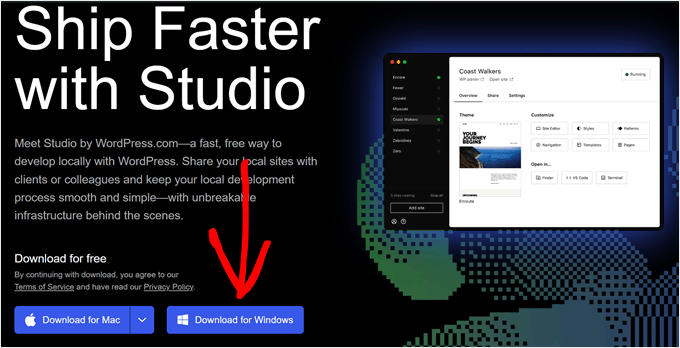
Una volta fatto ciò, basta aprire il file scaricato per avviare l’installazione.
A questo punto apparirà una finestra popup che indica che l’applicazione è in fase di installazione.
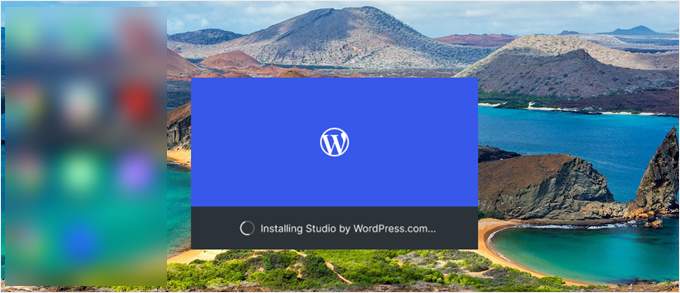
Fatto questo, si può aggiungere il primo sito.
Per farlo, basta inserire il nome del nuovo sito WordPress locale e fare clic su “Aggiungi sito”. Potete dare al sito il nome che preferite, purché vi aiuti a identificarlo facilmente.
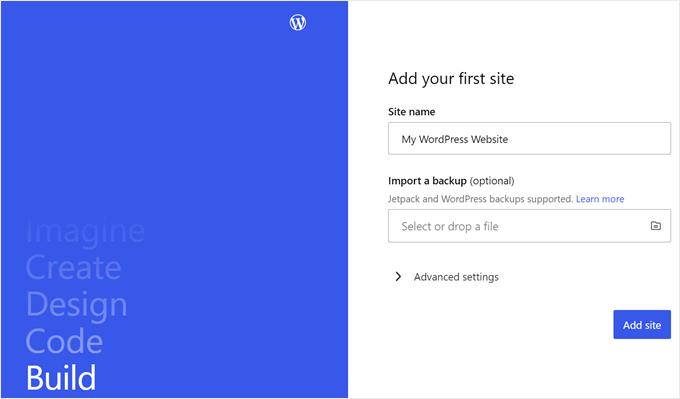
Ora dovreste vedere la dashboard del vostro sito WordPress locale.
Per accedere alla dashboard di WordPress e modificare il sito web, è sufficiente fare clic sul pulsante “Start” nell’angolo in alto a destra. In questo modo il vostro sito web locale sarà accessibile sul vostro computer.
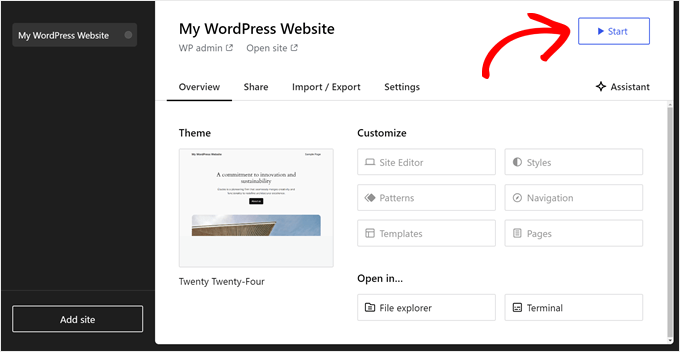
Una volta modificato il pulsante “Avvio” in “In esecuzione”, si può fare clic sul link “WP Admin” in alto a sinistra della pagina.
In questo modo si accede alla pagina di amministrazione locale di WordPress.
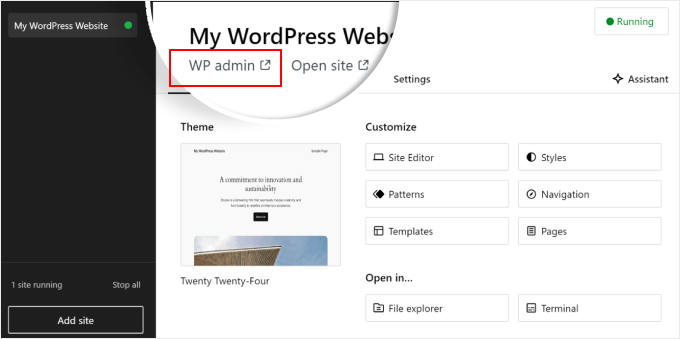
E questo è praticamente tutto per la configurazione. Esaminiamo le altre impostazioni che possono essere necessarie per la creazione del vostro sito web locale.
Come si può vedere nella scheda “Panoramica”, è possibile accedere immediatamente al menu dell’editor completo di WordPress direttamente dalla dashboard di Studio. Potete anche fare clic su “Esplora file” per aprire le cartelle e i file del vostro sito WordPress e fare clic su “Terminale” per gestire il vostro sito web utilizzando WP-CLI.
Se passate alla scheda “Condividi”, potete accedere al vostro account WordPress.com, clonare il vostro sito web locale e caricarlo sui server di WordPress.com. In questo modo il sito clonato sarà temporaneamente online, il che è utile per condividere siti demo con i vostri clienti o membri del team.
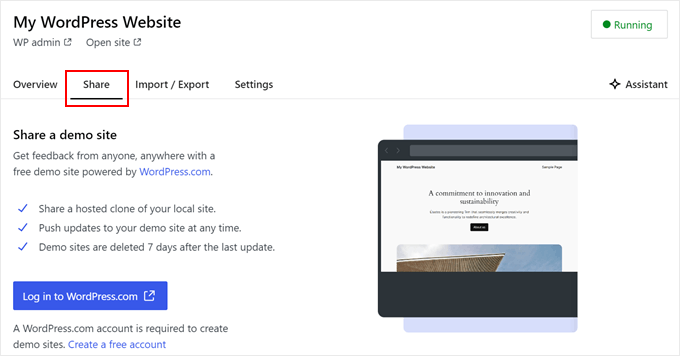
A volte si può desiderare di accedere al proprio sito web locale direttamente tramite il browser, invece di utilizzare Studio. In questo caso, è necessario conoscere le credenziali di wp-admin.
Per trovarli, potete passare alla scheda “Impostazioni” e trovare il nome utente, la password e l’URL di accesso dell’amministratore di WordPress.
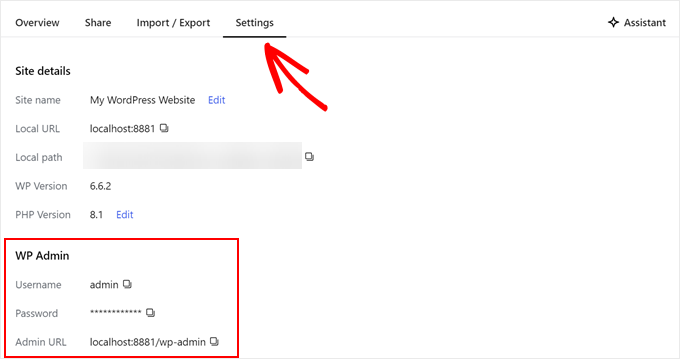
Un’altra caratteristica interessante di Studio è il chatbot AI integrato, con il quale è possibile comunicare facendo clic sul pulsante “Assistente”.
Qui è possibile chiedere aiuto a Studio per compiti come l’aggiornamento di tutti i plugin in una sola volta, l’aggiornamento della versione principale di WordPress o la creazione di codice per un blocco personalizzato.
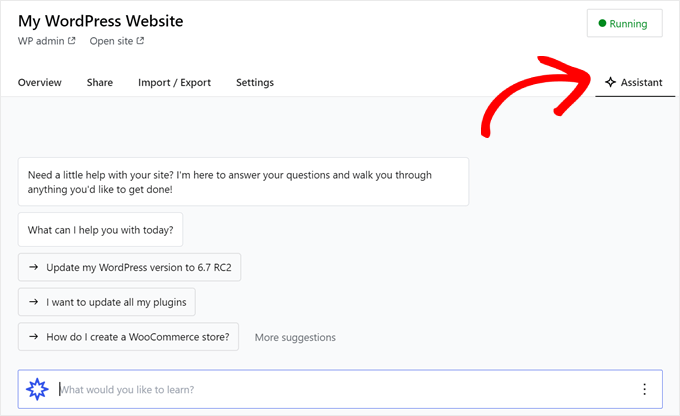
Quando avete finito di lavorare sul vostro sito locale, passate sopra il pulsante “In esecuzione” nell’angolo in alto a destra fino a quando non appare la scritta “Stop”.
Quindi, fare clic sul pulsante per interrompere il sito web.
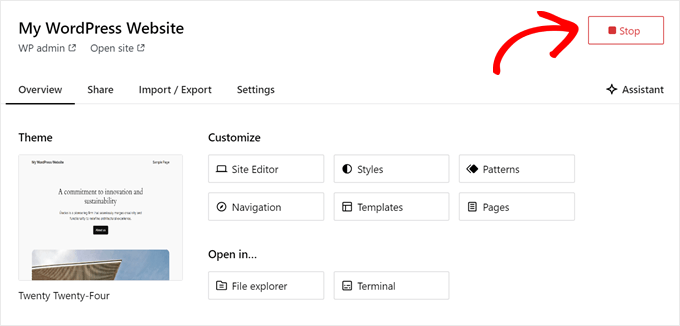
Un aspetto negativo di Studio è che non è possibile configurare l’ambiente WordPress a proprio piacimento. Ciò significa che dovete utilizzare la versione di PHP, il server web e il database che sono stati preselezionati per voi.
Questo può essere uno svantaggio se avete bisogno di testare il vostro sito web o plugin con configurazioni specifiche del server.
Se avete bisogno di un maggiore controllo sull’ambiente WordPress locale o di far coincidere la vostra configurazione locale con una specifica configurazione del server live, potete verificare il metodo successivo che prevede l’uso di WP locale.
Metodo 2: Installare WordPress su Windows utilizzando WP locale (più personalizzabile)
Innanzitutto, è necessario scaricare e installare il software Local WP sul proprio computer Windows. Basta andare sul sito web di Local WP e fare clic sul pulsante “Download for Free”.
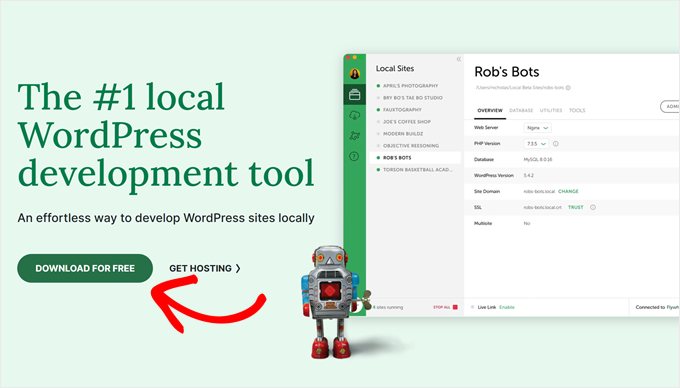
Successivamente, apparirà una finestra popup in cui dovrete selezionare la vostra piattaforma. Scegliete “Windows” dal menu a discesa.
Successivamente, è possibile inserire i propri dati, come nome e cognome, indirizzo e-mail di lavoro e numero di telefono, per scaricare il software.
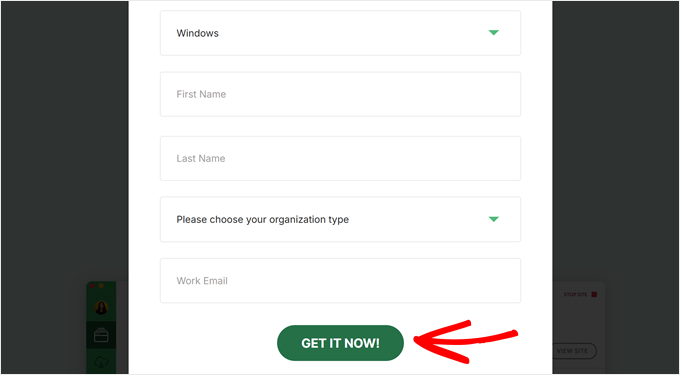
Dopo aver inserito i dati, è sufficiente fare clic sul pulsante “Ottieni ora”.
Successivamente, il software verrà scaricato automaticamente nel computer. Altrimenti, è possibile fare clic sul link “clicca qui” per avviare il download.
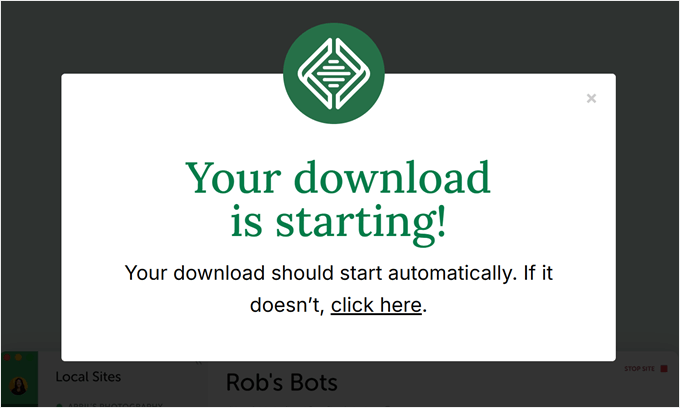
Una volta scaricato il file, avviate la procedura guidata di installazione.
A questo punto, dovrete selezionare se volete installare il software per tutti gli utenti o solo per voi.
Una volta selezionata un’opzione, fare clic sul pulsante “Avanti”.
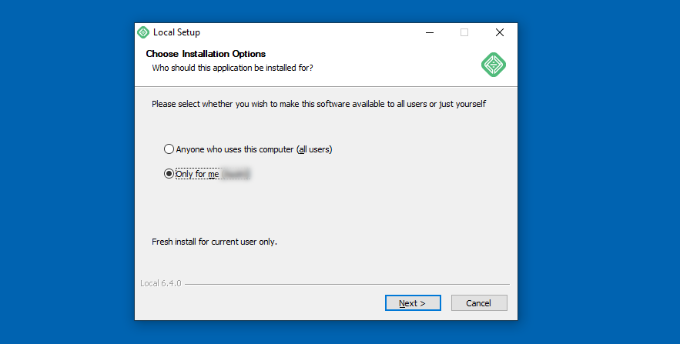
Nel passaggio successivo, è possibile selezionare la “cartella di destinazione” in cui verrà installato il software.
È sufficiente fare clic sul pulsante “Sfoglia” per impostare il percorso e quindi fare clic sul pulsante “Installa”.
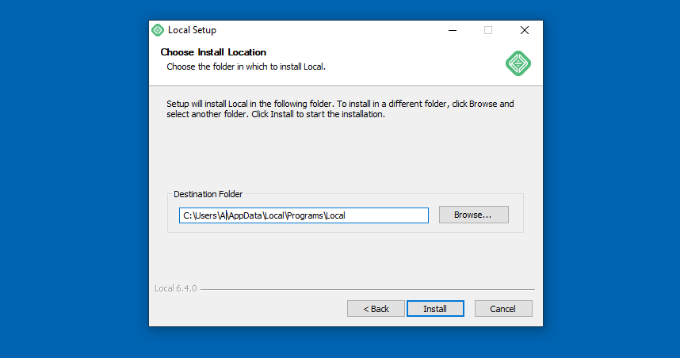
Il software Local WP viene ora installato sul computer Windows.
Una volta terminato, è possibile selezionare la casella di controllo “Esegui in locale” e fare clic sul pulsante “Fine” nella procedura guidata di installazione.
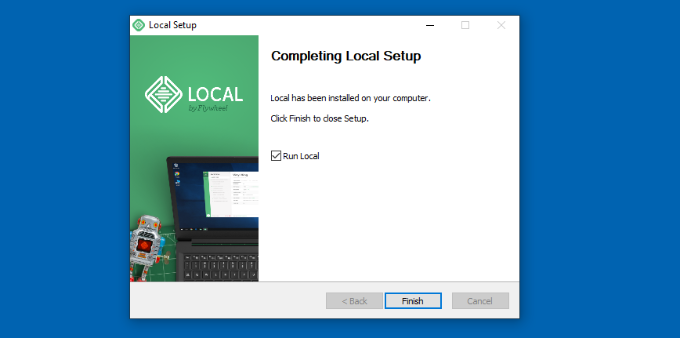
A questo punto il software si avvia sul dispositivo Windows.
Il passo successivo consiste nell’aggiungere un nuovo sito web locale. Per farlo, è sufficiente fare clic sul pulsante “+” in basso.
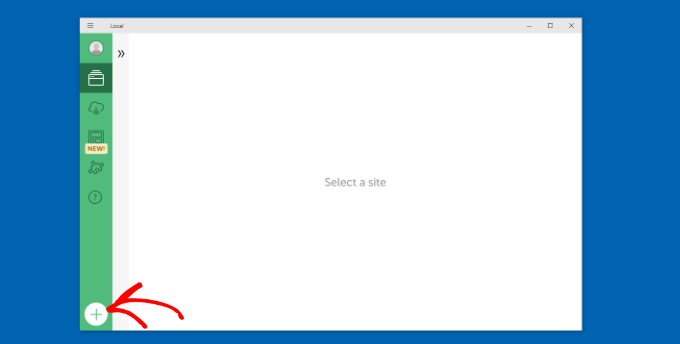
Successivamente, è possibile creare un sito nel software Local.
Selezionare l’opzione “Crea un nuovo sito” e fare clic sul pulsante “Continua”. È possibile creare il sito partendo da un blueprint o da un file di sito esistente, ma a scopo dimostrativo sceglieremo la prima opzione.
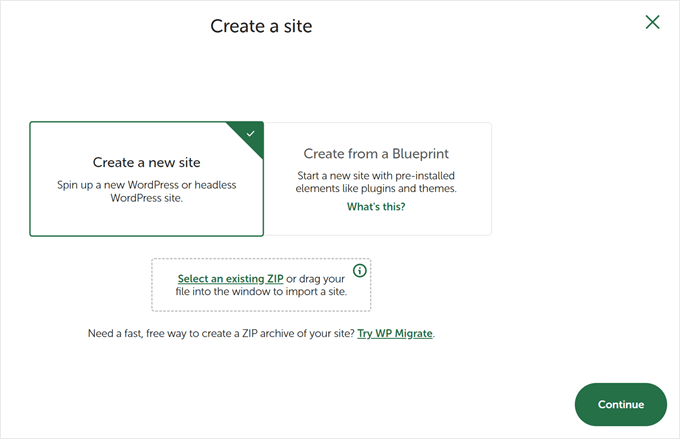
Successivamente, è possibile inserire un nome per il sito web locale, ad esempio “Il mio sito WordPress”.
Sono disponibili anche opzioni avanzate in cui è possibile inserire il dominio del sito locale e il percorso del sito locale. Per impostazione predefinita, il dominio utilizzerà il titolo del sito web, ma separato da trattini.
Una volta terminato, è sufficiente fare clic sul pulsante “Continua”.
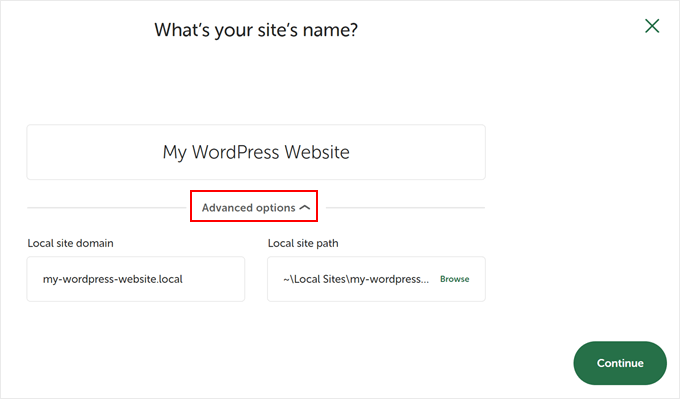
Successivamente, è necessario scegliere un ambiente per il sito web locale.
È possibile utilizzare l’ambiente “Preferito”, in cui il software selezionerà automaticamente la versione di PHP, il server web e la versione di MySQL. D’altra parte, si può anche selezionare “Personalizzato” e inserire i dettagli dell’ambiente.
Local WP offre le ultime versioni di PHP. Per quanto riguarda il server web, è possibile scegliere tra Nginx e Apache. È inoltre possibile scegliere tra MySQL o MariaDB per i database.
Si noti che alcune versioni di PHP, server web e database richiedono il download di alcune dipendenze per funzionare correttamente.
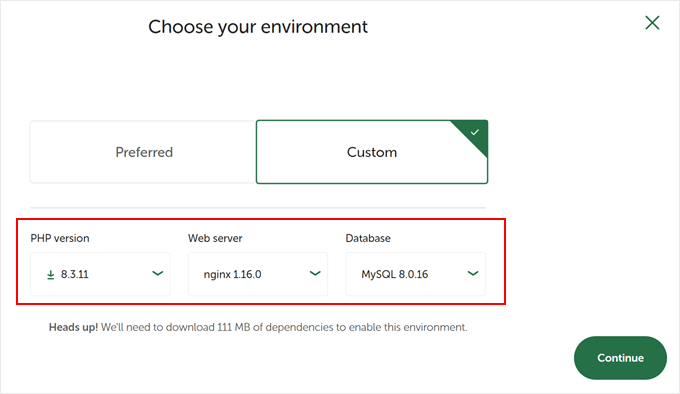
Successivamente, è possibile inserire un nome utente e una password di WordPress per il sito web locale. Inoltre, è possibile scegliere un indirizzo e-mail di WordPress per ricevere tutte le notifiche via e-mail.
Oltre a questo, c’è un’opzione avanzata in cui il software vi chiederà se avete una rete WordPress multisito. In caso contrario, basta fare clic su “No”.
Dopo aver inserito questi dati, è sufficiente fare clic sul pulsante “Aggiungi sito”.
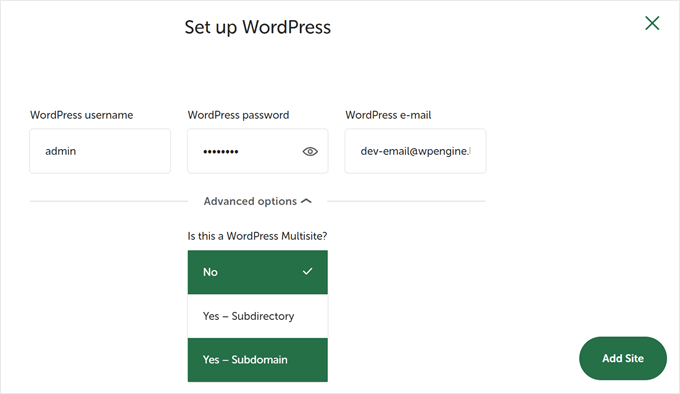
Il software installerà ora WordPress e configurerà il vostro sito web.
Per avviare il sito web locale, fare clic sul pulsante “Avvia sito” nell’angolo in alto a destra.
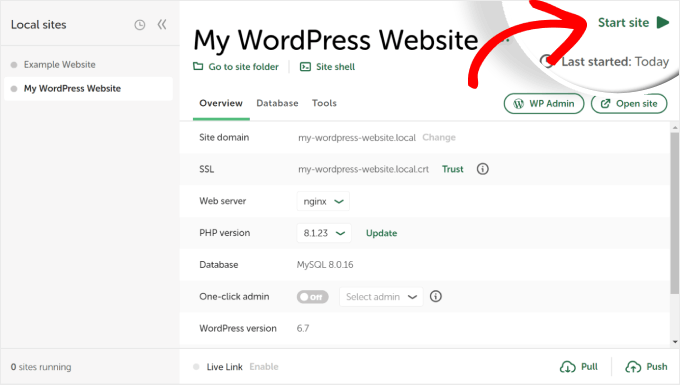
Quindi, fate clic sul pulsante “WP Admin” e vedrete la pagina di accesso all’amministrazione di WordPress.
È sufficiente inserire il nome utente e la password immessi in precedenza durante la configurazione del sito web locale, quindi fare clic sul pulsante “Accedi”.
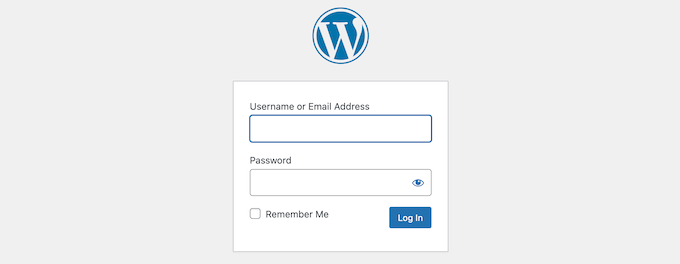
Ora è possibile modificare il sito web locale sul computer Windows.
Una volta terminato, non dimenticate di fermare il sito web dal software Local WP facendo clic sul pulsante “Stop site”.
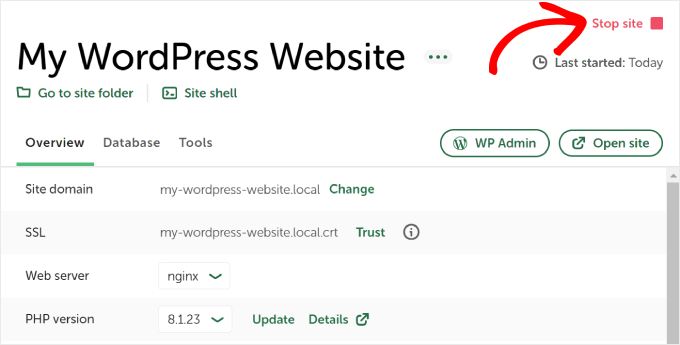
Suggerimento: se si desidera saltare il processo di login, è possibile abilitare il login dell’amministratore con un solo clic in Local WP.
Per farlo, basta tornare alla dashboard di WP locale e attivare il pulsante “Amministratore con un solo clic” fino a quando non appare la dicitura “On”. Quindi, nel menu a discesa, selezionare l’utente amministratore che può utilizzare questa funzione di accesso con un solo clic.
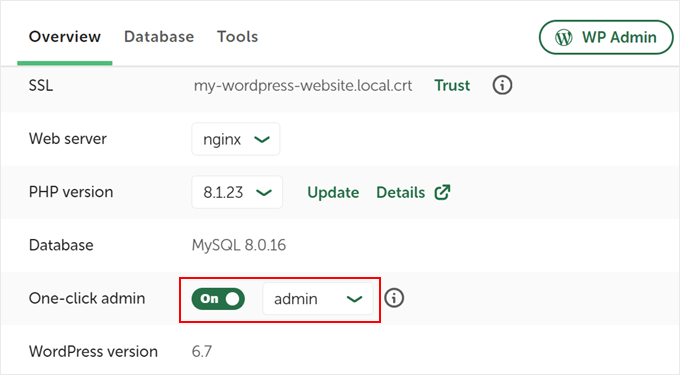
Alternativa: Usare WordPress Playground per testare temi, plugin e altro ancora
WordPress Playground è uno strumento innovativo che consente di sperimentare WordPress direttamente nel browser web. Si tratta di una sandbox virtuale in cui è possibile provare nuovi temi, plugin e funzionalità di WordPress senza influire su alcun sito web reale.
WordPress Playground si differenzia da un ambiente WordPress locale per diversi aspetti fondamentali.
Innanzitutto, non richiede l’installazione sul computer e si ripristina dopo ogni utilizzo, a differenza delle installazioni locali permanenti. È possibile accedervi da qualsiasi dispositivo dotato di browser, mentre le installazioni locali sono legate a un solo computer.
Mentre WordPress Playground è ideale per test e apprendimento rapidi, un ambiente WordPress locale sul vostro computer Windows offre maggiore flessibilità per progetti di sviluppo a lungo termine.
Per una guida dettagliata, consultate la nostra guida su come utilizzare WordPress Playground nel browser.
Ho installato WordPress sul mio computer Windows, e ora?
Ora che avete WordPress sul vostro computer, ecco alcune cose che potete fare:
- Imparate i suggerimenti e i trucchi di base di WordPress per utilizzare meglio il vostro sito.
- Provate diversi temi di WordPress per vedere come può apparire il vostro sito.
- Installate e testate i plugin WordPress indispensabili per aggiungere nuove funzionalità al vostro sito.
- Imparate a risolvere gli errori più comuni di WordPress da soli.
- Provate diversi page builder drag-and-drop per dare al vostro sito un aspetto gradevole.
- Imparate a reimpostare la password di amministrazione di WordPress su localhost per recuperare l’accesso al vostro sito.
- Impostate flussi di lavoro automatizzati per semplificare la gestione del sito.
- Imparate a conoscere la sicurezza di WordPress per mantenere il vostro sito al sicuro dagli hacker.
- Spostate il vostro sito WordPress locale su un server live quando siete pronti a condividerlo con tutti.
Speriamo che questo articolo vi abbia aiutato a capire come installare WordPress in locale su un computer Windows. Potreste anche consultare il nostro articolo su come installare WordPress in locale su un computer Mac e la nostra guida definitiva alla creazione di un sito di staging per WordPress.
Se questo articolo vi è piaciuto, iscrivetevi al nostro canale YouTube per le esercitazioni video su WordPress. Potete trovarci anche su Twitter e Facebook.





Thomas
Great tutorial! I’m trying to download a wordpress site to a local copy. I’ve based my self on this tutorial. So far this is what I’ve done right (I think…):
1- I’ve downloaded all the files from the live website using FileZilla to wamp/www/mysite/.
2 – I’ve exported, downloaded and zipped the live site database.
3 – Using WAMP>phpmyadmin I’ve created a new database and imported the zip file (from 2)
4- Changed the wp-config.php and updated the database name, user and password.
Now at this point, I’m able to see the homepage when I type http::/localhost/mysite. The them has been rest however. Also, the admin side as far as I can tell works perfectly.
The main problem I’m getting is that apart from the homepage I get 404 errors for all the other pages on the local site.
I’m not sure what I’m doing wrong! Thanks in advance!
George
Thanks so much. I have everything up and running. Very helpful. I would not have been able to do this on my own.
maggie
xampp is good for wordpress .It supports max range of url and all
maggie
thanks… It was helpfull and easy
karis
Been postponing this with the misconception that the process is tedious and takes time. Wow, thanks to you, I am now done. So easy. Thanks again for the good work. May it never go unrewarded.
Dmitry M
Thanks for the tut, very easy to follow.
Naaz
great..!! was as simple as 1+1 :p
Marty
Excellent, worked 110%. Thanks dude!
Bob S
This was an awesome tutorial! Thanks for the help
Faisal Masood
Thanks for sharing the nice WordPress resources.
Sabine Blackburn
Have it all installed but can not create a database in MyphpAdmin, it shows ‘No Privileges’ where the create button should be
Any suggestions?
David
After following your instructions, I got everything right except when I wanted to log in with the “root” username. When I log in, I get this message ” #1045 Cannot log in to the MySQL server”. Please what should I do?
WPBeginner Staff
Try to log in with blank password if that does not work you would need to reset root password for your MySQL server.
pran
how to change the root password
Gabriel Popov
Thanks, this article was really useful.
Omar
Amazing!! thanks a ton!!
Aaron
Downloaded everything. I can access wordpress but need to create a database for wordpress. When i click on phpmyadmin it takes me to a 403 forbidden error saying You don’t have permission to access /phpmyadmin/ on this server. I cant figure it out.
Annie L
Hello – your tutorial rocks. I’m able to get pass the 5 min setup and land on the WordPress login page.
One issue, after entering the same credentials provided in the 5-min setup (/wordpress/wp-login.php), I get “SSL connection error.”. Looking at the wp-login.php file, it forces a redirect to SSL.
How do I get around it without installing a SSL locally?
Running Wamp 2.4, Windows 7, Chrome browser.
lubna
really help tutorial bro.I just cant log in to word after the successful installation Help.
Miriam
I think your tutorials are clearer than anything else I find for a newbie like me. Thanks!
Can you offer any suggestions for my problem creating a database? I already have a WP site under Bitnami. I decided to download WAMP to have multiple WP sites using WAMP. After installing WAMP, when I open phpMyAdmin I get a log in window. If I log in using the username/pswd originally set up (with Bitnami installation) it says I don’t have priveliges to create a database. I can log into phpMyAdmin using the usename/pswd from the Bitnami WordPress site and I have priveliges but it gives me a 1044 Error when I try to create a new database. I am not sure what to try next. Thanks in advance for any suggestion you may have.
Miriam
I figured out that problem and am on to a different problem. After installing WAMP and putting WordPress in c:WAMP/WWW… I open a browser and try http://localhost/mysite/ but get a 404 Not Found. Could this be related to the fact that I already have Bitnami/localhost? Thanks!
Win
You didn’t paste it in the www folder. You can’t post it in the main wordpress file — you have to navigate to the www folder and paste it next to the index.html file. This should fix your 404 error problem
Merom
Hi,
I am facing the same problem. what exactly should I paste to www?
thanks
IBAS
I really found this tutorial so helpful to me, thanks for the efforts
Kriss
Wamp Server is an outdate program died on 2013. Probably it is not the best for wordpress
Laurent Lafont
You are not saying what the username and password are when launching phpmyadmin! And all web searches are giving dummy information as well….. So now stuck…. very useful instructions indeed…….
Win
Username: Root
Password: Blank
Helen Magner
Thanks for the instruction. It worked well. I have had a wordpress site up and running for a year now. but now but I would like to be able to import it to to local site so that I can write and save wile I cannot connect to the internet and publish when I can get back on line. Thanks for your help.
ludovic
Simply perfect. Merci !!!
Robert
When i follow the steps wampserver to myphpadmin I get the login page, not the page which allows me to click on the database tab as shown in your very well written tutorial. Suggestions to get the wp-config.php file set up?
Dave
I had the same problem, just leave the password blank & you’ll get in.
Psdfreak.com
On that login page fill Username: “root” and press login (no password required)
Maryam Jamil
thanks alot
your article really helps
Dharmesh Joshi
Thanks you bro…(Y)
Vivi
Hey! Really helpfull article, But… I can’t log in in wordpress..Firstly , in the step of installing wordpress i was directed in a blank page( logo only) , then i reloaded and said it has allready been istalled, so i procceded with the log in, but it seems that my account is not valid..nothing workd..not even the e-mail for getting a new pswrd .
What should i do? I allready copied the steps twice from the beggining with different databases and data.
nel
your tutorial worked PERFECTLY
ty
Andy
Please help . Thanks
installed WAMServer, as according to your instructions, I chose phpMyadmin, and I encountered this error msg, “HTTP Error 404.0 – Not Found
The resource you are looking for has been removed, had its name changed, or is temporarily unavailable.
Detailed Error Information
Module IIS Web Core
Notification MapRequestHandler
Handler StaticFile
Error Code 0×80070002
Requested URL http://localhost:80/phpmyadmin/
Physical Path C:\inetpub\wwwroot\phpmyadmin\
Logon Method Anonymous
Logon User Anonymous”
I installed and re-installed WAMServer, but encounter the same error, how do I proceed from here?
farah
Hi, Thank you for great tutorial, I am facing an issue please help me to solve the issue. After successful installation of WAMP, when I have clicked on PhpMyAdmin , It is asking me to login , but i dont know what is my username and password that can be used here?
Regards
Farah
WPBeginner Support
Try username root and leave password field blank
Admin
Barbara
I had the same error and other sites had very complicated and, frankly, unsuccessful suggestions on how to fix it. Thank you for this clear and simple solution – it worked!
KarSho
Simple, Clear and Helped.
Thanks Dude…
zubekk
thanks dude………..!
Sara
Hey there! I installed WampServer like you said but when i press phpmyadmin it opens a blank chrome webpage. No database menu or anything like the printscreen you showed. it’s just blank. I’ve tried unistalling and installing again but it remains the same. help!
WPBeginner Support
Where do you press phpMyAdmin? Try accessing it using the url http://localhost/phpmyadmin/
Admin
Sara
I pick the WampServer icon out of the taskbar and pick the phpmyadmin just like in your printscreen. No, that didn’t work either. I don’t know what can be wrong!
Sara
Ok, reboot the system and It opened something on the phpmyadmin but it’s asking me login and password!
Omer
Hi. Although this article is helpful, however I would like to give some suggestions in improving it. There are some fill in the blanks in this article which makes it difficult to install wordpress.
1. After instructing on installing Wamp Server 2, you immediately jump to phpmyadmin where as you should have told that we need to install mySQL -service- install service and start it. Then we have to install apache – service – install service and start it. Then after making sure that the wamp icon is green head over to the phpmyadmin.
2. After opening the localhost site, you didn’t mention that the username was “root” and password was blank for the database site and jumped immediately on creating database through database tag.
Apart from that it was great effort.
hujat ul islam
can you help me in installing word press on xampp
sumit
while installing wamp server it wll shows error again and again.. . error is about MSVC3100.dll file error.. . kindly fix this error
LIsa
I installed wamp successfully, renamed database, installed wordpress, entered all fields and then once I hit the final “install wordpress”, got a weird blank screen with the wordpress logo at the top. When I hit the “back button” it said wordpress was already installed so I tried entering the username and password and it says it is not found. I tried entering the email I had entered to reset the password and says it isn’t found. I tried using the instructions above for changing the password within the phpmyadmin found the Wp-users file in my database and clicked on pencil icon to edit users and it says “my sql returned an empy result” … help!
Lisa Tomsio
Never mind … I just deleted wordpress installation, created a new database and started over and it worked. I had unchecked the “allow search engines …” on the wordpress page the first time so I left it checked the second time and it worked fine. Thanks for this information!
Campbell
I installed WAMServer, as according to your instructions, I chose phpMyadmin, and I encountered this error msg, “HTTP Error 404.0 – Not Found
The resource you are looking for has been removed, had its name changed, or is temporarily unavailable.
Detailed Error Information
Module IIS Web Core
Notification MapRequestHandler
Handler StaticFile
Error Code 0x80070002
Requested URL http://localhost:80/phpmyadmin/
Physical Path C:\inetpub\wwwroot\phpmyadmin\
Logon Method Anonymous
Logon User Anonymous”
I installed and re-installed WAMServer, but encounter the same error, how do I proceed from here?
yousef mayeli
hi there
i installed many times with different options but same problem,it’s icon appears and when i click it to proceed it doesn’t appear anything. i don’t know what should i do.just disappointed
yousef mayeli
i installed wamp and its icon came on desk but when i click on it doesn’t open i even went to my skype and changed but didn’t affect anything , thanks
. guide me
WPBeginner Support
Try installing WAMP again.
Admin
sumit
while installing wamp server it wll shows error again and again.. . error is about MSVC3100.dll file error.. . kindly fix this error
please help meee….
Kevin Salt
Good article … Thanks.
I don’t want to nit-pick but I think you’re missing a semi-colon in the Skype section …
“and go to Tools » Options. Click on Advanced and then Connections.”
——————-> »
al b
I seem to be hung up on the http://localhost/mysite/ I get a 404 Not found error.
Al B
Disregard. I overlooked renaming the WP directory when moving to www. Thank you for this tutorial!
WPBeginner Support
make sure you have WordPress installed there. Make sure your WAMServer is running.
Admin
Kenia
I had just installed WAMP and then had no idea how to proceed from there as there is no manual for WAMP. This and the next article on making the wordpress site live are both lifesavers. Seriously. THANK YOU for writing this for beginners, and not assuming we know things we don’t (I see that a lot with experts: they take their knowledge for granted and forget what it’s like to start out and not know things).
THANK YOU, THANK YOU, THANK YOU!!!
Martin
Hello Guys, all done.. no matter what I am doing.. still last step freezes. I see only WP white-blue logo and white unloaded text box. After typing my website I get: “Error establishing a database connection” error. Any ideas? Cheers.
Chris
Thanks so much for this! Successfully installed. Only problem I ran into was with the wp-config.php file. I needed to open the copy of wp-config-sample.php, make changes on my own and then save. Other than that, easy install.
Amelia
When I went to click on “create database” in phpmMyAdmin, it said “X No privileges”. What did I do wrong?
Amelia
No matter, I got that fixed. Now I’m just stuck on the configuration page, info filled out and hit submit but the install wordpress page never comes up!
om gupta
in my laptop wamp server is not working in the local user account .it work only in administrator account but i want to run wamp server in local user account because i do not have administrator access right pls help me how can i run wamp server in my local user account.
WPBeginner Support
Without administrator rights it would be difficult for you to run wamp.
Admin
Ratan
Hi ,
I followed the complete step and dowloaded the WP and started uploading theme . With my first theme only , I got the below message after tryin to install the same :
The uploaded file exceeds the upload_max_filesize directive in php.ini.
Please guide .
Regards ,
WPBeginner Support
Please check out this guide: How to increase the maximum upload size in WordPress
Admin
utpal
after install Wampserver i go to phpmyadmin, inthin a login option is here
where i get pass and id
WPBeginner Support
Try root for username and leave password blank.
Admin
Tony Leary
Same problem – that works. Thanks.
Alan
Hello again,
Per my last comment, I think I figured it out. Sorry for the bother.
Alan
Thanks for the write-up! Wondering if you might have any ideas as to why I cannot create a db from phpmyadmin? After clicking “databases” to create a db, I get a “loading” message for quite some time, then that disappears & nothing…
The same occurs no matter which tab I select in the phpmyadmin dash. Been Googling for over an hour & I haven’t been able to find a solution. Thanks again!
WPBeginner Support
Try uninstalling and then reinstalling WAMP server. If that does not help you can also install XAMPP.
Admin
Maureen
Hi Guys! Step by Step Wonderful! Installed WAMP successfully, set up database, downloaded wp with no problem Sucess! now log in… user name or password invalid… press here to have password sent via email… i receive this message “The e-mail could not be sent.
Possible reason: your host may have disabled the mail() function.” any help is appreciated!
WPBeginner Support
Check out our guide on how to reset a WordPress password from phpMyAdmin
Admin